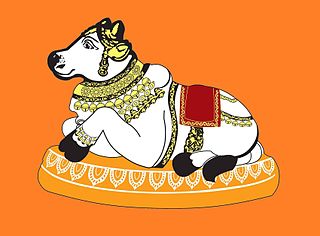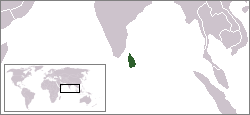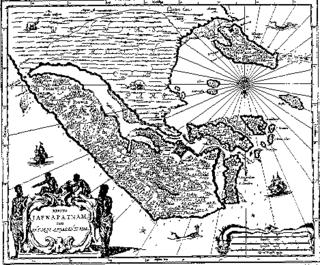In law, domicile is the status or attribution of being a lawful permanent resident in a particular jurisdiction. A person can remain domiciled in a jurisdiction even after they have left it, if they have maintained sufficient links with that jurisdiction or have not displayed an intention to leave permanently.
Choice of law is a procedural stage in the litigation of a case involving the conflict of laws when it is necessary to reconcile the differences between the laws of different legal jurisdictions, such as sovereign states, federated states, or provinces. The outcome of this process is potentially to require the courts of one jurisdiction to apply the law of a different jurisdiction in lawsuits arising from, say, family law, tort, or contract. The law which is applied is sometimes referred to as the "proper law." Dépeçage is an issue within choice of law.

Hinduism has a long tradition and is the oldest religion in Sri Lanka. More than 2000 years civilization have proved so far from Hindu temples in Sri Lanka. Hindus currently make up 12.60% of the Sri Lankan population, and are almost exclusively Tamils apart from small immigrant communities from India and Pakistan such as the Sindhis, Telugus and Malayalees. In the 1915 census they made up almost 25% of the population, which included the indentured labourers the British had brought. Despite emigration, today they are still a sizeable minority. Hinduism is dominant in the North and Eastern provinces, where there are predominantly Tamil people. Hinduism is also practised in the central regions as well as in the capital, Colombo. According to the government census of 2011, there are 2,554,606 Hindus in Sri Lanka constituting 12.6% of the country's population. During the Sri Lankan Civil War, many Tamils fled to other countries. There are Hindu temples abroad which were built by the Sri Lankan Tamil diaspora to maintain their religion, tradition and culture.

The Jaffna Kingdom, also known as Kingdom of Aryachakravarti, of modern northern Sri Lanka was a historic monarchy that came into existence around the town of Jaffna on the Jaffna peninsula traditionally thought to be established after the invasion of Magha, who is credited with the founding of the Jaffna kingdom and is said to have been from Kalinga, in India. Established as a powerful force in the north, north east and west of the island, it eventually became a tribute-paying feudatory of the Pandyan Empire in modern South India in 1258, gaining independence in 1323, when the last Pandyan ruler of Madurai was defeated and expelled in 1323 by Malik Kafur, the army general of the Muslim Delhi Sultanate. For a brief period, in the early to mid-14th century, it was an ascendant power in the island of Sri Lanka when all regional kingdoms accepted subordination. However, the kingdom was eventually overpowered by the rival Kotte Kingdom, around 1450 when it was invaded by Prince Sapumal under the Kotte Kingdom's directive.

Sri Lankan Tamils, also known as Eelam Tamils, Ceylon Tamils or simply Tamils, are members of the Tamil ethnic group native to the South Asian island state of Sri Lanka. Today, they constitute a majority in the Northern Province, live in significant numbers in the Eastern Province and are in the minority throughout the rest of the country. 70% of Sri Lankan Tamils in Sri Lanka live in the Northern and Eastern provinces.
Sri Lankan Mukkuvar is a Tamil caste found in the coastal regions of Sri Lanka.
Koviyar is a Tamil caste found in Sri Lanka. They are traditional agriculturalists and temple workers. Kattavarayan as caste deity is observed by the Koviar.
Mukkuva laws is the traditional law of Tamil inhabitants of Batticaloa district, of Sri Lanka codified by the Dutch during their colonial rule in 1707. The Law in its present form applies to most Tamils in eastern Sri Lanka. The law is personal in nature, thus it is applicable mostly for property and marriage.

Sri Lankan Moors are an ethnic minority group in Sri Lanka, comprising 9.2% of the country's total population. They are mainly native speakers of the Tamil language with influence of Sinhalese and Arabic words. They are predominantly followers of Islam. The Sri Lankan Muslim community is divided as Sri Lankan Moors, Indian Moors and Sri Lankan Malays as per their history and traditions.
The expulsion of the Muslims from the Northern province was an act of ethnic cleansing carried out by the Tamil militant Liberation Tigers of Tamil Eelam (LTTE) organisation in October 1990. Due to increasing tensions between the Muslims (Moors) and Tamils in the North Sri Lanka and the Muslim opposition to the creation of a Tamil homeland, the LTTE forcibly expelled the 72,000 strong Muslim population from the Northern Province.

Sri Lankan place name etymology is characterized by the linguistic and ethnic diversity of the island of Sri Lanka through the ages and the position of the country in the centre of ancient and medieval sea trade routes. While typical Sri Lankan placenames of Sinhalese origin vastly dominate, toponyms which stem from Tamil, Dutch, English, Portuguese and Arabic also exist. In the past, the many composite or hybrid place names and the juxtaposition of Sinhala and Tamil placenames reflected the coexistence of people of both language groups. Today, however, toponyms and their etymologies are a source of heated political debate in the country as part of the political struggles between the majority Sinhalese and minority Sri Lankan Tamils.
Sri Lankan Vellalar is a caste found in Sri Lanka, who comprise about half of the Sri Lankan Tamil population. They were traditionally involved in agriculture, but also included merchants, landowners and temple patrons. They also form part of the Sri Lankan Tamil diaspora.
Uthayan is a Tamil language Sri Lankan daily newspaper published by New Uthayan Publication (Private) Limited, part of the Uthayan Group of Newspapers. It was founded in 1985 and is published from Jaffna. Its sister newspapers is the Colombo based Sudar Oli. Uthayan was the only newspaper published from Jaffna which did not cease publication due to the civil war. The newspaper has been attacked several times, a number of its staff have been murdered by paramilitary groups and other forces, and it regularly receives threats.

The Vanni chieftaincies or Vanni principalities was a region between Anuradhapura and Jaffna, but also extending to along the eastern coast to Panama and Yala, during the Transitional and Kandyan periods of Sri Lanka. This land was a collection of chieftaincies of principalities that were a collective buffer zone between the Jaffna Kingdom, in the north of Sri Lanka, and the Sinhalese kingdoms in the south. The emergance of these chieftaincies were a direct result of the breakdown of central authority and the collapse of the Kingdom of Polonnaruwa in the 13th century, as well as the establishment of the Jaffna Kingdom in the Jaffna Peninsula. Control of this area was taken over by dispossessed Sinhalese nobles and chiefs of the South Indian military of Māgha of Kalinga (1215–1236), whose 1215 invasion of Polonnaruwa led to the kingdom's downfall. Sinhalese chieftaincies would lay on the northern border of the Sinhalese kingdom while the Tamil chieftaincies would border the Jaffna Kingdom and the remoter areas of the eastern coast, outside of the control of either kingdom.

The Portuguese conquest of the Jaffna kingdom occurred after Portuguese traders arrived at the rival Kotte Kingdom in the southwest of modern Sri Lanka in 1505. Many kings of Jaffna, such as Cankili I, initially confronted the Portuguese in their attempts at converting the locals to Roman Catholicism, but eventually made peace with them.
The 1978 Constitution of Sri Lanka provides for the election of members of Parliament from 22 multi-member electoral districts through the proportional representation electoral system.

The Northern Province is one of the nine provinces of Sri Lanka, the first level administrative division of the country. The provinces have existed since the 19th century but did not have any legal status until 1987 when the 13th Amendment to the Constitution of Sri Lanka established provincial councils. Between 1988 and 2006 the province was temporarily merged with the Eastern Province to form the North Eastern Province. The capital of the province is Jaffna. The majority of the Sri Lankan Civil War was played out in this province.

Mannar District is one of the 25 districts of Sri Lanka, the second level administrative division of the country. The district is administered by a District Secretariat headed by a District Secretary appointed by the central government of Sri Lanka. The capital of the district is the town of Mannar.

Valvettithurai, sometimes shortened as VVT or Valvai, is a coastal town of Jaffna District on the northeast coast of the Jaffna Peninsula in Northern Province, Sri Lanka governed by an Urban Council of the same name. Valvettithurai was historically known as a seafaring port and its olden shipping trade.










